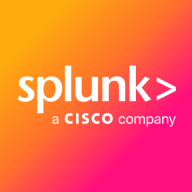![i-SIEM [EOL] Logo](https://images.peerspot.com/image/upload/c_scale,dpr_3.0,f_auto,q_100,w_64/lm2hfus1tm88hmfj6huefb8r1sfh.jpg?_a=BACAGSGT)

Splunk Enterprise Security and i-SIEM [EOL] are competing products in the security information and event management space. Splunk Enterprise Security seems to have the upper hand due to its comprehensive integration and advanced threat detection features.
Features: Splunk Enterprise Security provides advanced threat detection, incident response, and integration capabilities, which cater to complex environments. i-SIEM [EOL] includes robust analytics, a flexible rule engine, and cost-effective features for specific needs.
Ease of Deployment and Customer Service: Splunk Enterprise Security offers a structured deployment model with reliable customer service for enterprise setups. i-SIEM [EOL] has a simpler deployment process, appealing to smaller teams.
Pricing and ROI: Splunk Enterprise Security involves higher setup costs but offers significant ROI through its powerful features and long-term support. i-SIEM [EOL] offers lower initial investment, focusing on cost-effectiveness for specific markets.

| Company Size | Count |
|---|---|
| Small Business | 109 |
| Midsize Enterprise | 50 |
| Large Enterprise | 264 |
i-SIEM [EOL] is an innovative security information and event management platform designed to enhance threat detection and response capabilities in IT environments.
i-SIEM [EOL] offers a comprehensive approach to managing and analyzing security alerts, ensuring that businesses can effectively mitigate risks. With advanced threat intelligence and robust analytics, it helps organizations streamline their security operations and improve incident response times, providing each organization the information required to make informed security decisions.
What are the most important features of i-SIEM [EOL]?i-SIEM [EOL] is particularly beneficial in industries such as finance and healthcare where data security is paramount. Its ability to integrate with existing infrastructure allows seamless adoption, offering enhanced security without disrupting operations. Industries handling sensitive information value its advanced capabilities to safeguard data integrity.
Splunk Enterprise Security delivers powerful log management, rapid searches, and intuitive dashboards, enhancing real-time analytics and security measures. Its advanced machine learning and wide system compatibility streamline threat detection and incident response across diverse IT environments.
Splunk Enterprise Security stands out in security operations with robust features like comprehensive threat intelligence and seamless data integration. Its real-time analytics and customizable queries enable proactive threat analysis and efficient incident response. Integration with multiple third-party feeds allows detailed threat correlation and streamlined data visualization. Users find the intuitive UI and broad compatibility support efficient threat detection while reducing false positives. Despite its strengths, areas such as visualization capabilities and integration processes with cloud environments need enhancement. Users face a high learning curve, and improvements in automation, AI, documentation, and training are desired to maximize its potential.
What Are the Key Features of Splunk Enterprise Security?In specific industries like finance and healthcare, Splunk Enterprise Security is instrumental for log aggregation, SIEM functionalities, and compliance monitoring. Companies leverage its capabilities for proactive threat analysis and response, ensuring comprehensive security monitoring and integration with various tools for heightened operational intelligence.
We monitor all Security Information and Event Management (SIEM) reviews to prevent fraudulent reviews and keep review quality high. We do not post reviews by company employees or direct competitors. We validate each review for authenticity via cross-reference with LinkedIn, and personal follow-up with the reviewer when necessary.